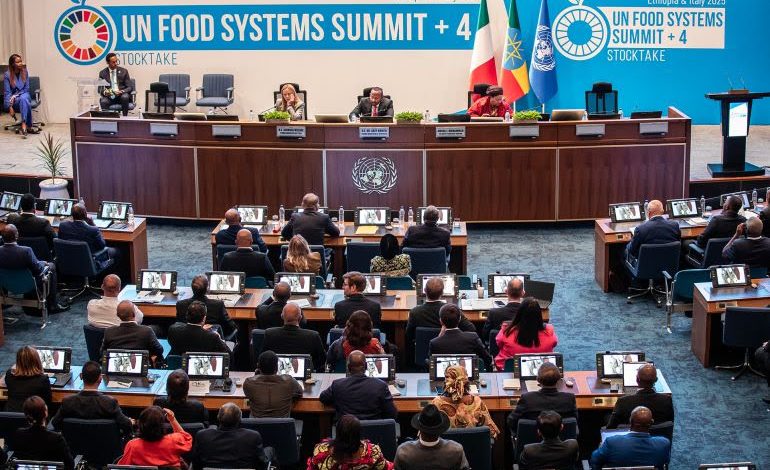Hunger at the Center of Discussion at the UN Food Systems Summit in Addis Ababa

Sudan Events – Agencies
The reception ceremonies at Bole International Airport in the Ethiopian capital Addis Ababa were striking, even along the main road connecting the airport to accommodation sites and the UN Economic Commission for Africa.
Amid the flags of various countries and organizations, the Food Systems Summit stood out with its focus on combating hunger driven by war, conflict, and climate change.
Guterres Condemns the Use of Hunger as a Weapon
Speaking virtually at the UN Food Systems Summit in Addis Ababa, UN Secretary-General António Guterres denounced what he called the “use of hunger as a weapon,” in a direct reference to Israel’s actions in the Gaza Strip, where daily images depict extreme suffering from malnutrition, drought, and death under the eyes of the world.
Guterres pointed to the armed conflicts in Gaza and Sudan as major contributors to the growing hunger crisis, calling for increased investment in agriculture as a key step to address worsening food insecurity.
Meanwhile, UN Deputy Secretary-General Amina Mohammed called for urgent action to establish ceasefires, ensure the return of displaced populations, and open humanitarian corridors in both Gaza and Sudan. Speaking to Al Jazeera, she stressed that continued violations constitute breaches of international law.
FAO: Gaza Is the Worst Case
This summit, which saw broad international participation from heads of state and international organizations, is the second of its kind since 2021, when the first was held in New York under the theme “Building Resilient and Sustainable Food Systems to Eliminate Hunger.”
It comes at a time when over one billion people around the world are suffering from extreme poverty due to unemployment, conflict, high living costs, and natural disasters—especially in rural areas, where over 80% of the world’s poor reside.
According to the UN’s Food and Agriculture Organization (FAO), 733 million people are currently suffering from hunger—roughly one in every eleven people globally.
The FAO identified Gaza as the worst hunger case on record, posing a global challenge to finding sustainable solutions through cooperation between governments and food-focused organizations.
The Spread of Hunger in Africa
This is the first summit of its kind held on the African continent. It aims to review the progress made since the 2021 Food Systems Summit in New York and to evaluate the paths of reform and transformation in food policy.
However, these goals may not be achieved unless “Africa becomes an active player in global food security transformation,” as stated by Italian Prime Minister Giorgia Meloni during her address to the summit.
Meloni emphasized the importance of fair access to food markets, enhancing self-sufficiency, and reinforcing food sovereignty. She underscored that food security is no longer just a humanitarian concern but a major political and economic issue in the face of cascading global crises.
She noted that global challenges such as inflation and the war in Ukraine have sharply worsened the situation, pointing out that “one in every five people in Africa suffers from hunger,” which demands urgent international action for sustainable development and crisis mitigation.
Comprehensive Reform of Food Systems
With hopes that the summit will trigger a fundamental transformation in the global food system, agriculture emerged as a central theme for shaping humanity’s future. The roadmap for comprehensive reform focuses on supporting local production, encouraging innovation, developing markets, and addressing the impact of conflict on people’s lives.
During the opening session, Ethiopian Prime Minister Abiy Ahmed called for building a hunger-free future—especially for children. He stressed that the summit should serve as a launchpad for real reform of food systems through youth training, combating illiteracy, enhancing supply chain policies, and enabling a diverse economy under flexible conditions.
He also highlighted Ethiopia’s “Food Basket Initiative,” which focuses on agricultural diversity and fishery resources.
In the same context, Secretary-General Guterres pointed to the major global challenges led by climate change and armed conflict, which now stand as key obstacles to achieving food security and equitable access to food.
He praised Ethiopia’s success in achieving tangible results in local wheat production, contributing to job creation and national self-sufficiency.
Farmers as Cornerstones of Development
Delegations from participating countries and organizations agreed that climate change, geopolitical tensions, and economic turmoil are having an unprecedented impact on global food systems, necessitating an urgent collective response.
In this regard, Italian Prime Minister Meloni described farmers as the “cornerstone” of food development, emphasizing that food is not merely a means of survival but an element of national identity and sovereignty that must be protected and enhanced through local communities.
She also reviewed Italy’s efforts in transferring agricultural knowledge to several African countries, including Senegal, Congo, Ghana, Algeria, and Tunisia.
For his part, Ethiopian Agriculture Minister Girma Amenti called for accelerating international cooperation to achieve the Sustainable Development Goals (SDGs) by 2030. He urged countries that have made progress to maintain momentum and support the global path toward food justice and sustainability.
Ethiopia’s Agricultural Transformation
The summit served as a serious platform to renew commitments around funding and policy for building more just and resilient food systems in the face of global crises.
In this context, Ethiopia showcased its achievements in its “Green Legacy” program, having planted more than 40 billion seedlings. It also highlighted its major advances in wheat production, particularly since the outbreak of the war in Ukraine—demonstrating the country’s ability to turn challenges into opportunities for improving local food security.
This summit is expected to pave the way for practical shifts as complaints about hunger and poverty grow and as the global sense of urgency increases regarding climate change, the need to end wars, and the demand for bold action to secure a better future for nations and generations to come.
Source: Al Jazeera



